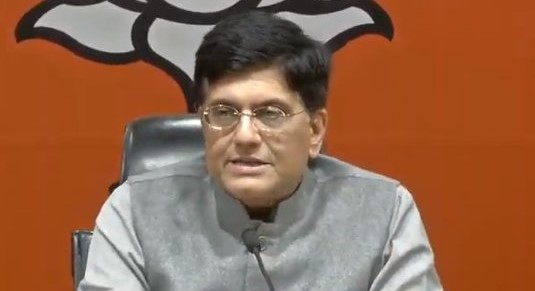India open for engagement with RCEP nations again if our concerns are addressed: Goyal

- Country:
- India
Commerce and Industry Minister Piyush Goyal on Tuesday indicated that India is open for negotiations if the member countries of RCEP would come up with a better offer that can address concerns and provide greater market access for the domestic industries. He, however, said that for the present it is the final decision of the government that India will not join the China-backed mega free trade agreement -- Regional Comprehensive Economic Partnership (RCEP).
Prime Minister Narendra Modi in Bangkok on Monday said that India will not join the RCEP deal as negotiations failed to address New Delhi's "outstanding issues and concerns". As many as 16 countries -- 10 nation bloc ASEAN and its six trading partners including India -- were negotiating the mega free-trade pact RCEP.
"For the present, it is the final decision, we are not joining RCEP. But if all our demands are met which will give the Indian industry more scope for growth, will open better markets without adversely affecting India's interest...I think, every government is always open for discussion and negotiations," Goyal told reporters here. "In international engagement and relations, the doors never shut with anybody ... If they make a sincere effort to resolve our concerns, to give us confidence and help us to balance this trade inequality, then I think every nation should talk to their friends, hum koi dushmani karke nai baithe hain kisis ke sath (we do not have any animosity with any nation)," he added.
India adopted a tough stand at the RCEP on issues like balancing huge trade deficit with countries like China; a mechanism to check sudden surge in imports or dumping goods; strong norms for rules of origin, the base year for reduction of duties should be 2019 instead of 2014, and unfair trade practices. The minister said that the lesson to be learnt from these negotiations is that one should never finalize a trade agreement in a hurry and with a timeline, like it was done in 2010-11 with Japan, Korea, and ASEAN.
"Trade discussions should allow enough time and considerations so that they are done carefully keeping the best interest of people and country," he added. When asked whether India is a deal-breaker at the last minute, he said that the country was raising these issues since 2014 and consistent on its stand to protect its national interest.
He added that during the UPA regime from 2004 to 2014, trade deficit with this grouping jumped significantly. Trade deficit has done significant harm to Indian economy and by taking the decision to not join RCEP reflects India's strong negotiating abilities.
"We did not withdraw from RCEP in an acrimonious manner. If we had suddenly got out in 2014, that could be a kind of acrimonious exit which would lead to a kind of uncertainty in trade and economic relations. We put forth our issues strongly...So India gone out with its head held high," the minister said. When asked about review of existing free trade agreements, he regretted that Congress signed these pacts with countries like Japan, Korea, ASEAN and Malaysia in a rush.
In these pacts, he said, India did not get market access for those products where it has a competitive advantage. After the prime minister raised these issues, "ASEAN is now ready for review. With Korea also, we have started and Japan to has agreed for review".
When asked about the status of FTA talks with the European Union, the minister said several European countries have asked India to consider resuming the talks, stalled since May 2013. "We must engage in this FTA. We can export a number of products to the EU. There were no discussions currently," he said.
The minister also hit out at the Congress party for criticizing the government, saying it was the Manmohan Singh government that had initiated the discussions for making India part of the RCEP grouping, ignoring the fact that it had a huge trade deficit with the member nations. The trade deficit with the RCEP grouping soared from USD 7 billion in 2004 to USD 78 billion in 2014.
The RCEP members were 10-nation bloc ASEAN, India, China, Japan, South Korea, Australia, and New Zealand. A joint statement issued after the RCEP leaders' summit stated that India has significant outstanding issues, which remain unresolved. All RCEP participating countries will work together to resolve these issues in a mutually satisfactory way. India's final decision will depend on the satisfactory resolution of these issues.
China also said on Tuesday that it will follow the principle of "mutual understanding and accommodation" to resolve the outstanding issues raised by India for not joining the Beijing-backed RCEP.
(This story has not been edited by Devdiscourse staff and is auto-generated from a syndicated feed.)
ALSO READ
Israeli explanation for aid workers deaths 'not good enough', Australia PM says
Ex-Marine facing extradition in Australia says wasn't US citizen at time of offence
Soccer-Australia leave Bayern-bound Irankunda out of Olympic qualifiers squad
Soccer-Australia leave Bayern-bound Irankunda out of Olympic qualifiers squad
George Russell says his crash at the Australian Grand Prix was ''waiting for a disaster to happen''










